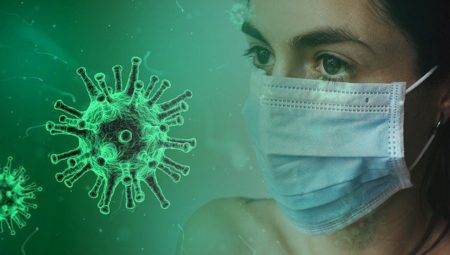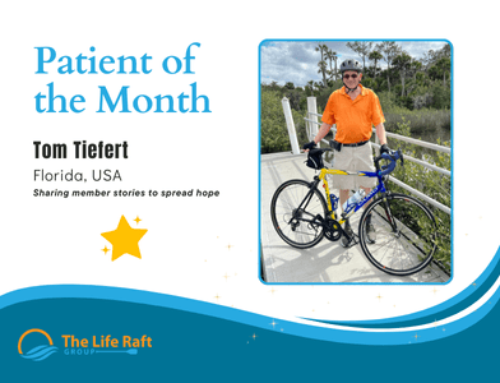 What does it mean for GIST patients during the COVID-19 pandemic?
What does it mean for GIST patients during the COVID-19 pandemic?
As information became available about the novel coronavirus, COVID-19, questions surfaced about which populations are considered “at-risk” for more severe complications. Most of the identified populations are self-explanatory. According to the Centers for Disease Control (CDC):
COVID-19 is a new disease and there is limited information regarding risk factors for severe disease. Based on currently available information and clinical expertise, older adults and people of any age who have serious underlying medical conditions might be at higher risk for severe illness from COVID-19.
Based on what we know now, those at high-risk for severe illness from COVID-19 are:
- People 65 years and older1
- People who live in a nursing home or long-term care facility
People of all ages with underlying medical conditions, particularly if not well controlled, including:2
- People with chronic lung disease or moderate to severe asthma
- People who have serious heart conditions
- People who are immunocompromised
- People with severe obesity (body mass index [BMI] of 40 or higher)
- People with diabetes
- People with chronic kidney disease undergoing dialysis
- People with liver disease
There is a great deal of confusion around the terms “immunocompromised”, “immunodeficient” and “immunosuppressed”.
Immunocompromised/Immunosuppressed
Immunocompromised or immunosuppressed means having a weakened immune system. Immunocompromised patients have a reduced ability to fight infections and other diseases. This may be caused by certain diseases or conditions, such as AIDS, cancer, diabetes, malnutrition, and certain genetic disorders. It may also be caused by certain medicines or treatments, such as anticancer drugs, radiation therapy, and stem cell or organ transplant. Also called immunosuppressed.
Cancer patients can become immunocompromised (at least for a period of time) due to the disease, as a result of treatment they are undergoing, or a combination of both reasons.3
As a GIST Patient, am I immunocompromised?
From a piece recently posted by Dr. Breelyn Wilky, GIST specialist:
“If you are on targeted chemotherapy pills or immune therapies, we don’t understand the impacts of these treatments yet on your risk of contracting or developing complications from coronavirus. The “quantity” of people’s white blood cells normally don’t change much on these types of therapies compared to traditional chemotherapy, but the effect on the “quality” of the immune response is not well understood. Particularly with immune therapies, the normal shut-off mechanisms for the immune system to STOP activating are blocked so that the immune system will hopefully attack the cancer cells – and so I worry about what that means if someone gets a viral infection. Much of the damage from coronavirus seems to be the robust inflammation that happens when the immune cells attack the virus – could this be even worse with those “safeguards” blocked? I have been counseling people that we should assume they may be at higher risk and should take all the precautions very seriously to try to avoid infection.” 4
Immunodeficient5
Primary immunodeficiency disorders — also called primary immune disorders or primary immunodeficiency — weaken the immune system, allowing infections and other health problems to occur more easily. Many people with primary immunodeficiency are born missing some of the body’s immune defenses or with the immune system not working properly, which leaves them more susceptible to germs that can cause infections. Some forms of primary immunodeficiency are so mild they can go unnoticed for years. Other types are severe enough that they’re discovered soon after an affected baby is born.
Many primary immunodeficiency disorders are inherited — passed down from one or both parents. Problems in the genetic code that acts as a blueprint for producing the cells of the body (DNA) cause many of the immune system defects.
Treatments can boost the immune system in many types of primary immunodeficiency disorders. Research is ongoing, leading to improved treatments and enhanced quality of life for people with the condition.
Prevention of Infection
 Because primary immune disorders are caused by genetic defects, there’s no way to prevent them. But when you can take steps to prevent infections:
Because primary immune disorders are caused by genetic defects, there’s no way to prevent them. But when you can take steps to prevent infections:
- Practice good hygiene.Wash your hands with mild soap after using the toilet and before eating.
- Take care of your teeth.Brush your teeth at least twice a day.
- Eat right.A healthy, balanced diet can help prevent infections.
- Be physically active.Staying fit is important to your overall health. Ask your doctor what activities are appropriate for you.
- Get enough sleep.Try to go to sleep and get up at the same time daily and get the same number of hours of sleep every night.
- Manage stress.Some studies suggest that stress can hamper your immune system. Keep stress in check with massage, meditation, yoga, biofeedback or hobbies. Find what works for you.
- Avoid exposure.Stay away from people with colds or other infections and avoid crowds.
- Ask your doctor about vaccinations. Find out which ones you should have.
The most important resource in determining whether or not you are immunocompromised is your oncologist/medical team. It cannot hurt to act as if you are immunocompromised, and take the precautions necessary to remain healthy.
References
1 Centers for Disease Control and Prevention, Coronavirus Disease 2019 (COVID-19), Older Adults. https://www.cdc.gov/coronavirus/2019-ncov/need-extra-precautions/older-adults.html
2 Centers for Disease Control and Prevention, Coronavirus Disease 2019 (COVID-19), Groups at Higher Risk for Severe Illness. https://www.cdc.gov/coronavirus/2019-ncov/need-extra-precautions/groups-at-higher-risk.html
3 NCI Dictonary of Cancer Terms https://www.cancer.gov/publications/dictionaries/cancer-terms/def/immunocompromised
4Cancer vs. coronavirus, Breelyn Wilky, MD, March 20, 2020.https://breelynwilkymd.com/2020/03/22/cancer-vs-coronavirus/
5 Mayo Clinic, Primary immunodeficiency, Symptoms & causes. https://www.mayoclinic.org/diseases-conditions/primary-immunodeficiency/symptoms-causes/syc-20376905



